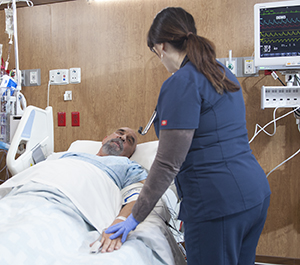After Minimally Invasive Heart Surgery: In the Hospital
After surgery, you’ll be moved to a recovery area or ICU (intensive care unit). There you can be closely watched. From there, you may go to a special care unit or a regular room. The hospital stay after minimally invasive heart surgery varies. But it's often 3 to 5 days.

Right after surgery
When you first wake up, you may feel groggy, thirsty, or cold. If the breathing tube given to you during surgery is still in place, you won’t be able to talk. Or you may have small plastic prongs in your nose to give you extra oxygen. You will have flexible tubes in your chest to drain air, blood, and fluid. IV (intravenous) lines give you fluid and medicines. You may also have a catheter in your bladder to drain urine. Monitors record your heartbeat and the amount of oxygen in your blood.
Managing pain
A nurse may give you pain medicines. Sometimes a special pump is used. The pump is called a patient-controlled analgesia pump (PCA). This pump lets you give yourself small amounts of pain medicine as you need them.
Strength and breathing exercises
You’ll soon begin to move around to improve your muscle strength and blood flow. Your nurse or a therapist will help you when you first get up and walk. You may also be taught range-of-motion exercises to help stretch and strengthen your muscles as they heal.
Deep breathing and coughing exercises help keep your lungs clear. They also make your breathing muscles stronger and prevent complications. A nurse or therapist may teach you these exercises before or soon after your surgery. Do them as instructed.
Taking medicines
If you have heart valve surgery, you may need to take a blood thinner (anticoagulant or antiplatelet medicines). How much of this medicine you need may take some time to adjust. Much of this adjustment will happen before you go home. Your healthcare team will talk with you about this and any other medicines you need. They will tell you the amount to take after you leave the hospital. They will also tell you when to be tested to see if your dose needs to change.
Going home
Before you go home, your healthcare provider will discuss the results of your surgery with you. Your provider will also review the next stage of your treatment plan and schedule future visits. When you’re ready to leave the hospital, you will need to have a friend or family member drive you home. You should be sure you have an up-to-date list of medicines with you when you go home. You should also have prescriptions for any new medicines you will need to take.
Online Medical Reviewer:
Mary Mancini MD
Online Medical Reviewer:
Ronald Karlin MD
Online Medical Reviewer:
Stacey Wojcik MBA BSN RN
Date Last Reviewed:
2/1/2022
© 2000-2024 The StayWell Company, LLC. All rights reserved. This information is not intended as a substitute for professional medical care. Always follow your healthcare professional's instructions.